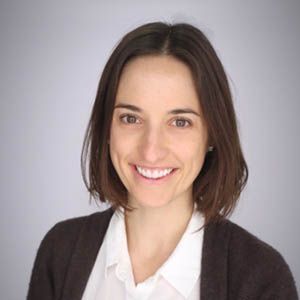
Lizie Sweeney has brains on the brain. More specifically, she has glioblastoma, a very aggressive form of brain cancer, at the front of her thoughts. As an Assistant Research Professor in the Department of Biochemistry and Molecular Medicine, she’s on a team researching novel therapies to treat this deadly disease.
What’s your story?
My story is pretty local! I grew up in northern Virginia and got my undergraduate degree in biomedical engineering at the University of Virginia. I actually didn’t decide to go into engineering until after I had been in school for about a year. I’ve always been into math and science and became fascinated with manipulating the human body, understanding how it works, and applying engineering principles to human health.
After I graduated, I moved to DC for my PhD in tumor biology at Georgetown, where I studied with Dr. V. Craig Jordan. I mostly worked on hormonal regulation in breast cancer. Then, I did my postdoc at Children’s National with Rohan Fernandes. When he moved his lab to GW in 2017, I came along with him. I’ve been with the Department of Biochemistry since 2021.
What gets you out of bed in the morning?
Physically, what gets me out of bed is my husband’s perfectly brewed coffee. It’s waiting for me in the kitchen – lucky me!
What drives me is the impact of our work in translational medicine. Every day in the lab, we're making strides directly affecting cancer patients. The urgency to find new treatments for these devastating diseases is palpable. I'm grateful for the opportunity to explore new ideas and contribute to their translation into the clinic.
What we’re developing should be cancer-agnostic. The platform can be applied to many different types of cancer. But glioblastoma has been a focus for us because of how poor the treatment options are and have been for several decades. We’re working with an awesome neurosurgeon, Carlos Sanchez, who is committed to helping us develop this technology. He’s helped us by collecting blood and brain tumor samples from patients to develop personalized cell therapy. We’re still in a preclinical phase, with clinical trials several years out.
What is that one book that has influenced you the most?
1984 by George Orwell is an influential book for many reasons—I’ve read it so many times! What always stuck with me is how important language is in creating thought. When you take away language, you take away ideas. This has subconsciously impacted how I brainstorm with people at work, using open-ended discussions to gradually uncover new understandings or formulate new hypotheses to test.
What absolutely excites you right now?
We’re developing a novel multi-targeted adoptive T-cell therapy using a nanoparticle-based photothermal therapy expansion platform. We believe we can advance it to become a great option for patients with solid tumors. It’s a personalized T-cell product made specifically for each patient, so it should have high anti-tumor efficacy with little safety concern. We’ve tested this platform in vitro and in xenograft models in vivo and seen some very promising results. I am most excited that we are working with the neurosurgeons at GW to test this platform using primary patient glioblastoma cells and the patient’s autologous blood. Once we prove we can make effective T cells using the patient samples, we will have a solid data foundation to submit in an IND application with the FDA to start a phase 1 clinical trial. That is the goal!
What is the most important thing we should know about you?
By far, the most important thing is that I’m a mom! I have a four-year-old daughter, Maxine, and a two-year-old son, Bennett. They inspire me to come here. It’s important for them to see me working on something meaningful that I’m passionate about. They have changed me and my life in all the best ways.



